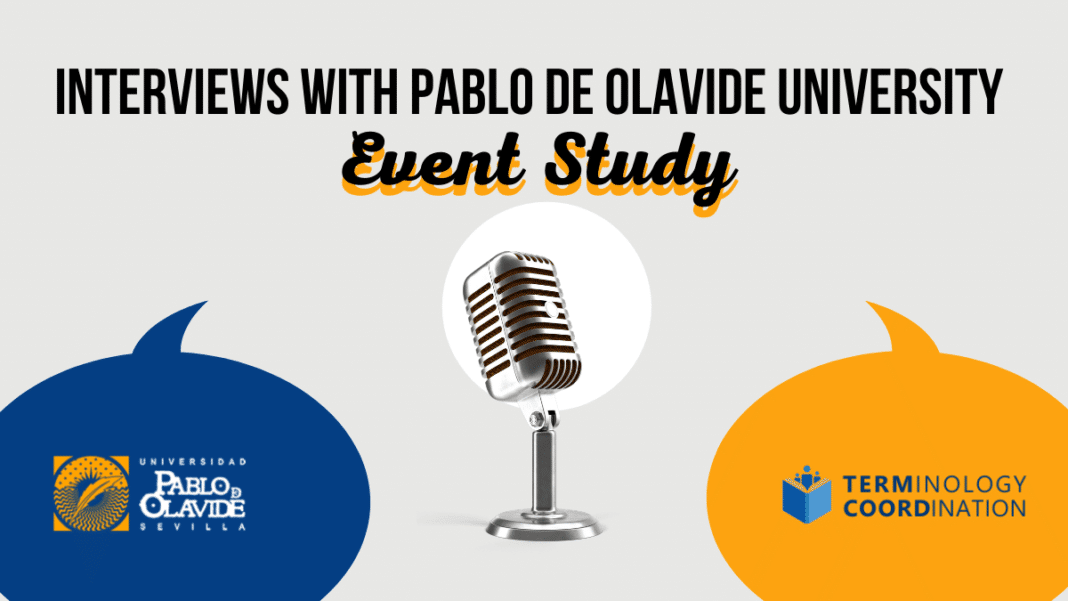Introduction
Over the summer of 2020, TermCoord interviewed 8 students and graduates of the Translation and Interpreting programme at the Pablo de Olavide University. You can listen to the finished interviews now on our ‘IATE goes AUDIO’ page.
Dr. Olga Koreneva, lecturer of Translation and Interpreting in German at Pablo de Olavide supervised the students throughout their interviews. She has analysed the interviews and created an event study, which sheds light onto how the translators of tomorrow face the challenges of a globalised world. This investigation is one of a series of projects based on cognitive terminology. Dr. Koreneva has already collaborated with TermCoord to create multiple event studies, including the events of the “Terminology Without Borders” YourTerm MED project, which you can find here. More information about cognitive terminology and events is available in this article on Frame-Based Terminology.
Interviews with Pablo de Olavide University: Event Study
The interview texts were collated into a corpus and analysed using Sketch Engine. Frequency lists have allowed to identify the main concepts, on which the field of knowledge of translation studies is based, as postulated by the cognitive theory Frame-based Terminology (Faber et al. 2006, Faber 2015, Faber et al. 2017). They were lemmatised and organised into the event structure in accordance with conceptual relations. Again, the presence of the basic macro-categories of AGENT, PATIENT, PROCESS, LOCATION and INSTRUMENTS, linked by their corresponding and characteristic conceptual relations, can be confirmed.

As you can see in the Event structure above, the Translation study clearly emerges both as a PROCESS of great challenge and discovery for students as PATIENT. However, this challenge is also successfully driven and supervised by teaching staff as AGENT. The process of discovery takes place in parallel with participation and decision making, understanding, apply and communication. Both teachers as well as students use INSTRUMENTS such as CAT tools, new technologies, documentary research, various resources and databases. Qualities and impulses such as personal interest, curiosity and necessity are likewise of great benefit in this process.
The multi-dimensional nature of the event structure very clearly reflects that students can take on the role of PATIENT as well as of AGENT. For the teacher as AGENT, students stand as PATIENT, but students themselves can also play the role of AGENT, for the learning process, texts, language, meaning, culture, etc. stand as PATIENT. The role of LOCATION is played by the university, but it can also be played by specialised areas of translation and interpreting. Here, medical and audiovisual translation emerged as fields young translators and interpreters are most attracted to.
The RESULT consists not only of gaining knowledge, experience and skills, which leads to confidence, but also of finding friends, support, and a better job, which positively affect students’ live and future.
The important finding of the present study is that the human and community feeling factors were very present and stood out in every aspect: understanding, communication, sign language, participation, help, friends, contact, culture, student exchange, medical translation, etc.
Once again, it has been proven that the cognitive approach is highly useful in modern linguistics. Frame-based Terminology (Faber et al. 2006, Faber 2015, Faber et al. 2017) provides a reliable basis for organising and presenting knowledge correctly in any language and field.
Overall, it can be said that, using the example of interviews with the Pablo de Olavide University in Spain, translation students give the impression of a very mature, open-minded, self-confident and motivated generation.
We, as today’s translators and interpreters or lecturers, can therefore confidently rely on our young successors and can trust that the future is in good hands.
References
Faber, Pamela; Montero Martínez, Silvia; Castro Prieto, María Rosa; Senso Ruiz, José; Prieto Velasco, Juan Antonio; León Araúz, Pilar; Márquez Linares, Carlos & Vega Expósito, Miguel (2006): «Process-oriented terminology management in the domain of Coastal Engineering», Terminology, 12(2), p. 189-213. John Benjamins Publishing Company, http://doi.org/10.1075/term.12.2.03fab
Faber, Pamela (2015): «Frames as a framework for terminology», Handbook of Terminology, Volume 1, p. 14-33, Abindgon-on-Thames, Routledge Editors, https://books.google.es/books?id=MQZoBwAAQBAJ
Faber, Pamela; Verdejo‑Román, Juan; León‑Araúz, Pilar; Reimerink, Arianne & Guzmán Pérez‑Carrillo, Gloria (2017): «Specialized knowledge processing in the brain: an fMRI study», Terminological Approaches in the European Context, http://host.uniroma3.it/eventi/TermsTerminologyEu/abstracts/Proposal_TTEC_Faber.pdf
Analysis by Dr. Olga Koreneva, professor in the area of Translation and Interpreting (German Philology) at the Pablo de Olavide University.

